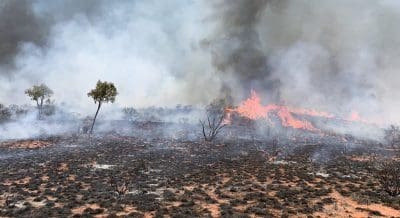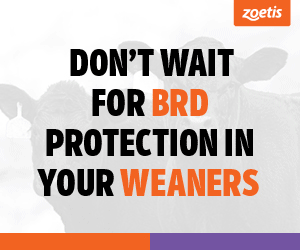Bushfires are adding fuel to an already challenging situation for northern cattle producers, destroying large tracts of grass needed to carry healthy cattle with skin markings or blemishes that the region’s primary market of Indonesia will not currently accept.
An Indonesian Government delegation has visited northern Australia to inspect cattle disease testing processes first hand in recent weeks, but it is not yet clear Indonesia’s zero-tolerance approach to accepting northern cattle with skin markings will end as a result of the high-level visit.

Fires have been burning across large parts of the Northern Territory for the past two months. Photo: Nicole Hayes
Cattle in northern Australia commonly receive skin markings from various causes including fly bites and bumps and scrapes that are not related to disease.
However, for more than two months, healthy cattle with skin blemishes that would previously have been cleared for export to Indonesia are now being rejected from consignments on the grounds they could be mistaken upon arrival for having early clinical signs of lumpy skin disease.
The crackdown was initiated in July after Australian cattle tested positive to LSD after arriving in Indonesia where the disease is widespread.
Lumpy Skin Disease has never been detected in Australia, with significant increases in testing of northern cattle in recent months not producing a trace of the disease.
Indonesia lifted a six-week-long suspension of imports of cattle from seven registered pre-export quarantine facilities on September 8, following extensive negotiations with Australian Department of Agriculture, Fisheries and Forestry officials.
However, Indonesian officials conveyed to DAFF officials that they expect Australian exporters not to export cattle with any clinical signs of infectious or contagious diseases, and will continue to scrutinise and test all consignments of Australian cattle upon arrival in Indonesia.
 Industry feedback suggests 10 to 40 percent of cattle consignments being put forward for export order to Indoneisa by northern producers are now being rejected by Government veterinarians in order to comply with Indonesia’s requirements, despite lumpy skin disease having never been detected in Australa.
Industry feedback suggests 10 to 40 percent of cattle consignments being put forward for export order to Indoneisa by northern producers are now being rejected by Government veterinarians in order to comply with Indonesia’s requirements, despite lumpy skin disease having never been detected in Australa.
Producers are having to carry those cattle for longer than intended where finding alternative buyers is very challening in a well-supplied market and with dry conditions limiting restocker demand.
DAFF denies other markets being affected by skin clampdown
Northern producers have also been concerned by reports that the same zero- tolerance approach to cattle with skin markings is also being applied to consignments for export to other markets such as Vietnam.
In response to that question a statement from DAFF spokesperson appeared to rule that out, replying “the approach to skin markings for the Indonesia market is different for other export markets”.
Access to markets such as the Philippines and Malaysia will be particularly crucial for northern producers this year as a potential outlet for healthy cattle with skin markings that Indonesia will not currently accept.
The industry hopes recent falls in the price of export northern cattle (currently being quoted within the 260c-280c/kg lw range) will encourage increased orders from price sensitive markets such as the Philippines, assisted by a relatively low Australian dollar (today at US63c).
Fires adding ‘real level of urgency’
In the meantime, bushfires are adding “a real level of urgency” to the situation, Northern Territory Cattlemen’s Association CEO Will Evans told Beef Central.

Will Evans. Image: NTCA
“More than 11 million hectares of the NT have burnt so far this year and we’re only at the mid-point of the fire season,” he said.
“We’ve got producers who’ve been fighting fires for months without reprieve.
“Maximising market access to our largest market for Top End cattle is critical and will only become more critical as the fire season progresses.”
Mr Evans said there is a pathway to resolution for the skin markings issue, but it “requires the Australian Government to continue to work with our trading partners to re-establish trust with our market and instil confidence in Australian systems and processes”.
“We are grateful for the work that has been done by Australian Departmental officials, but this isn’t a set and forget issue and where we are now simply isn’t acceptable as an end-point to negotiations.”
He said that while DAFF had an important role as a regulator it also has a similarly important role in supporting market access.
DAFF ‘continuing to engage’ with Indonesian quarantine authority
A DAFF spokesperson told Beef Central the department is “continuing to engage with the Indonesian quarantine authority” about the live cattle trade.
“The Indonesian quarantine authority has conveyed that it expects Australian exporters to not export cattle with any clinical signs of infectious or contagious diseases,” a statement from the Departmental spokesperson said.
“While Australia is free from Lumpy Skin Disease (LSD), a proportion of our northern cattle do present with various skin conditions that could be seen as a sign of disease.
“We will continue working with Indonesia on distinguishing various skin conditions that may be present in cattle that are not a sign of disease.”
The statement said that Indonesian quarantine authority agreed to lift its restrictions on Australian cattle imports on September 8 subject to ongoing compliance with several conditions, including some that are relevant to livestock with skin lesions.
“Indonesia is the customer for their product. It is the right of any market to request certain specifications of the products/animals they buy, and to change their requirements over time.
“The Indonesian quarantine authority has said that they will continue to test cattle/buffalo on arrival, particularly those with skin lesions, and will slaughter any animals that test positive to LSD.
“These are the market specifications conveyed by the Indonesian quarantine authority – not the Australian Department of Agriculture, Fisheries and Forestry, who in this circumstance is regulating to ensure exports.”



There seems to be a hidden agenda in this situation, possibly both political and commercial, in disrupting a trade that is a win-win situation for both Indonesia and Australia. A speedy outcome is in the best interest of both countries.